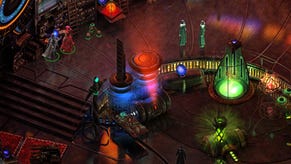Mark Jacobs Explains Camelot Unchained
The Holy Grail?
The Kickstarter to create a new Realm Vs Realm MMO successor to Dark Age Of Camelot has just two days left on the clock. They need three hundred thousand dollars at the time of writing. A tense time, then, for its lead Mark Jacobs. I spoke to the man behind Dark Age Of Camelot and Warhammer Online, and asked him about the story behind Camelot Unchained.
RPS: How did this happen? A new RvR MMO on Kickstarter? It sounds like an unlikely event.
Jacobs: We've been talking about MMOs here for almost a year now, because I've got a bunch of people who are truly eat-your-own-young types to win in these games, they're hardcore LoL players, and one of our guys knows more about Dark Age than I do! So there's a lot of interest. We've spent a lot of time talking about whether we're going to make an MMO again. And I kept coming back to the conclusion that I didn't really want to do another one, especially if it was going to be another five year MMO project, which is pretty much de rigeur now for a PvE game. Plus I had no interest in going to publishers to get finances. Investors, maybe. I mean it's funny, because when EA and I parted ways people said they wanted to do an MMO with me, and I said no then. After talking about it though, and then playing some Guild Wars 2, and then talking so that concepts started to come up, well, I got more interested. And then we saw all this interest in Kickstarter. If we did this right, we thought, then between what I am putting in, and what the backers are putting in, we could raise enough money to make a new RvR MMO. We can do it without publishers, we can do it without institutional investors who would of course demand a big piece of the company. It looks viable, people are making successful pitches. So we worked on it and pulled the trigger.
RPS: MMOs haven't had a good run on Kickstarter, though. Doesn't that present you with some serious challenges?
Jacobs: Oh absolutely. Look: MMOs are scary. They have the highest failure rate of any genre within our industry. We've had some successes, of course, and one unbelievable success, but if you look at it purely from a financial standpoint, well, they're not great investments! Especially if you are doing the themepark style game over many years. It's scary. It's scary for backers. That's one of the reasons why we went with RvR – not just because I really don't want to make another themepark game – but because it makes more sense for our backers. We have to be able to say that we can do this with a small team. We have to show them we can do it with a small team. And we're doing okay because of that, I think. We were at $1.6m the last time I looked at the ticker. But it's not a slam-dunk. I understand people's reluctance to back an MMO, or to back a small studio, or even personally – some people blame me for every ill in every MMO I've done, and even some I didn't do!

RPS: I have a pregnant sort of question, next: I think people are burned out on MMOs, and to invest time in an MMO they need to know that the game they're getting involved with is will reward that time they put in. Is this going to be that kind of game?
Jacobs: I totally agree on the point you make there. You've got an audience right now that has serious MMO fatigue. I don't know how many hours you put in, but I put in crazy hours on certain games. I was tired of them. I was tired of “here we go again”, tired of seeing the same quest I have seen God knows how many times. Committing a whole lot of time to do the same thing over and over gets old. Now, in our case, because it's going to be centered around player-interaction, whether it's building, craft, or RvR, I think that model can work to minimise MMO fatigue. You're going to be fighting different players and different strategies each night. That will help. We want to be able to reward people who can only put in a small amount of time. I don't know if you've looked at this, but we are doing a horizontal rather a vertical progression, and that means that the guys who come and can't keep up with the guys levelling up as fast as they can won't have gaps between them as large as they would be in a vertical system.
RPS: Is horizontal progression, combined with player-interaction, a way out of the themepark rut? It seems to have worked for Eve Online.
Jacobs: It's one of the ways out. I've never been a big believer in the silver bullet. There's not going to be one thing that gets us out of our problems, whatever those problems might be. But it is an avenue. The problem with that avenue is that player-interaction scares off a lot of players. A lot of people want to play MMOs to be surrounded by people, but they don't necessarily want to kill them or be killed by them. They want players without player interaction. But building a community is one of the ways out of that rut. It won't be huge numbers – chasing WoW's numbers is suicidally stupid. We know that. But there is a way out.

RPS: Why Camelot? What will Dark Age fans find here?
Jacobs: Why Camelot? Because I am a huge fan of the legends. I grew up on them. I got to see Richard Burton on Broadway in the play. I've always been a huge fan. Same with the other mythologies – if you are interested in Norse, well, we're going full-on Viking. But it's also about RvR. A pure RvR game. No other fantasy MMO is trying that. And I know for a lot of Dark Age fans that's not what they want to hear! In the beginning the vast majority of people played RvR, but those numbers dwindled. Most people were levelling via PvE. People who really want RvR, however, and want an interesting housing system – build them, and then burn them down! - people who want something different, that is who we are pitching it. A game is different but still has a connect to that same lore. This is it. We're doing interesting things with both lore and MMO game mechanics.
RPS: You've countered some of the ready-made criticisms of a successful developer using Kickstarter by offering up a big chunk of your own money, haven't you? Was that how it had to work to avoid the finger-pointing that has been going on regarding these sorts of pitches?
Jacobs: I don't know if it had to work that way. If you have a guy like Richard Garriot, a guy who could afford to put himself into space and back again, not putting any money in, or at least only prefunding some development, well, it doesn't have to work like that. It's not necessary. But I wanted to do this for our backers. Like I said, MMOs are scary, and I am the guy who is blamed, rightly or wrongly, for anything that went wrong with Warhammer and Dark Age. I wanted to put my money in and say “I am right in here with you.” I am not a billionaire! I don't come close! But I wanted to do this. And that's the other reason to do this, and go the Kickstarter route: to gauge interest, to see who else is interested in supporting this kind of concept. People are suffering from MMO fatigue, and for all I knew, had I gone and developed this myself, I might have found nobody playing it. This way we go to Kickstarter, and people who are interested get their chance, and we know we have an audience. That's important.
RPS: I've been having conversations about this stuff increasingly over the past year, particularly with gentlemen like yourself. Has the development landscape really change that much that you can and should self-published through means like Kickstarter?
Jacobs: Yes, I think the development landscape has change that much. Look how many publishers have gone in the past ten years. We've gone from an E3 which was overflowing with big budget publishers, to what it is now. We've lost ways for companies like Obsidian or ineXile to go to publishers and get money to make a game. And I think publishers have got greedy. Not just in terms of making a big profit for publishing – they should do that, after all – they are now greedy for IP. I had a publisher who was simply offering a distribution deal ask me for not only for a slice of revenue, but derivative rights! All they were doing was distributing. You would never hear that ten or twenty years ago. THQ said this, before they went belly-up, they wanted IP. They all want it. They want a real piece of the IP, and I have a real problem with that as a developer. I've done a number of deals over my career, but I've never given up a piece of the IP. Maybe it's because there are fewer publishers, and they can sit back and say “okay, good luck!” if they don't get what they want. But ultimately I think Kickstarter has the potential to be a very big deal for this industry. As big as the effect of consoles on the PC industry. If the majority of Kickstarter developers can deliver on their games, that puts power back in their hands. This whole thing puts power back in the hands of developers. And that might force publishers to change. People can now go away and distribute themselves, and that could end up making the industry better. It's an interesting and exciting time.
RPS: Thanks for your time.
Camelot Unchained is on Kickstarter.






